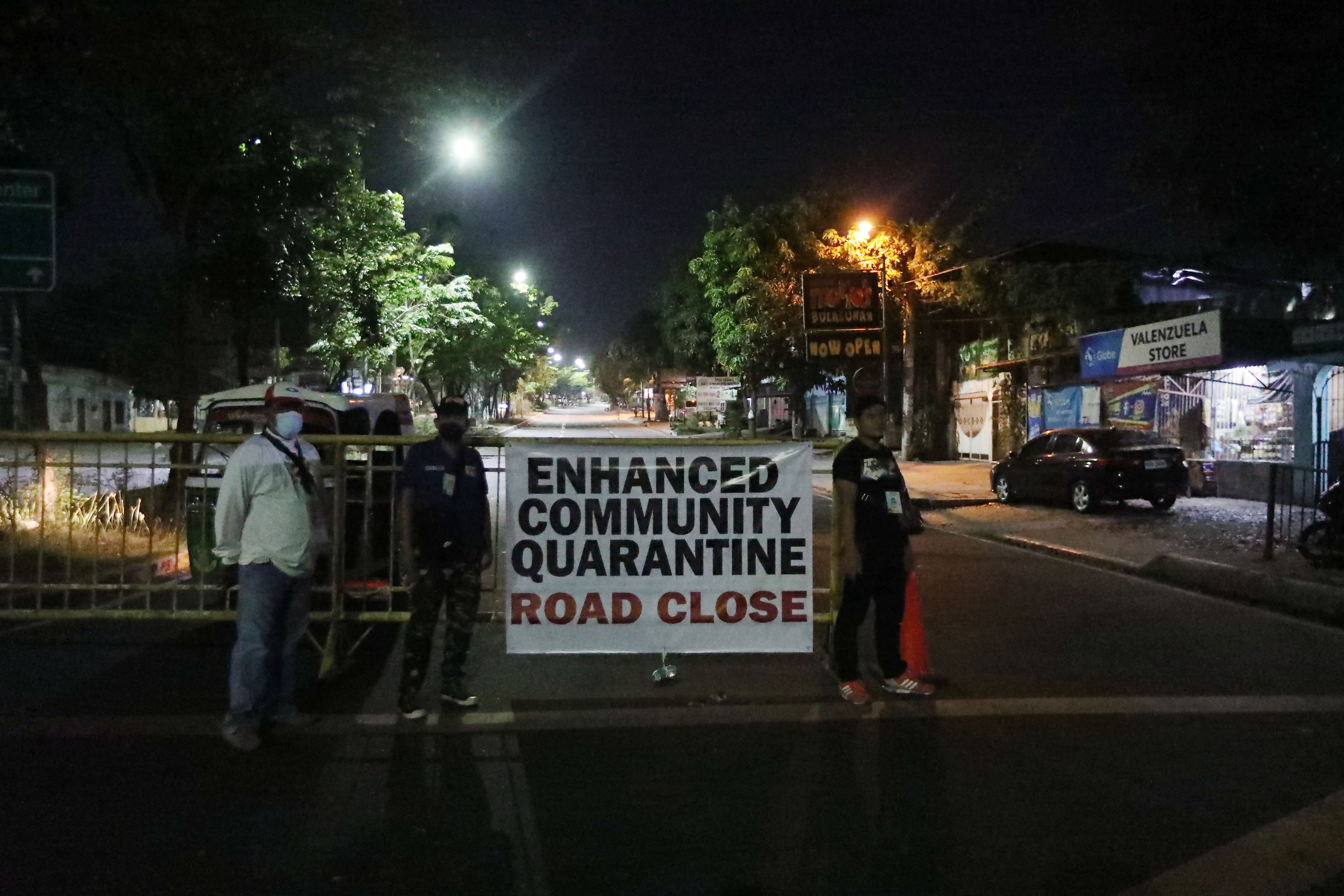Headline
ECQ to be enforced only in high-risk NCR areas: Palace

FILE: Barangay Public Safety Officers (BPSO) of Barangay Kaligayahan in Novaliches, Quezon City close the road at the corner of Commonwealth Avenue and Jordan Plains and only allow those who have emergency purposes during curfew hours on Thursday (March 19, 2020). (PNA photo by Oliver Marquez)
MANILA – Some areas in Metro Manila that are considered high risk of the coronavirus disease 2019 (Covid-19) will remain under enhanced community quarantine (ECQ), Malacañang said on Saturday.
Presidential Spokesperson Harry Roque made the statement, as he dismissed as “fake news” the rumors about the supposed fate of areas placed under ECQ after May 16.
While the Inter-Agency Task Force for the Management of Emerging Infectious Diseases (IATF-EID) has yet to make a final recommendation to President Rodrigo Duterte, it seeks the implementation of the general community quarantine (GCQ) in Metro Manila areas that have low cases of Covid-19, Roque said.
“Ang desisyon kung ano yung mga lugar na mananatili sa ECQ will be granular na tinatawag at it will also be surgical (The decision on areas where ECQ should remain will be granular and surgical),” he said during the Laging Handa program.
“So hindi po totoo na lahat ng lugar sa Metro Manila ay magiging GCQ na at hindi naman totoo na ang buong Metro Manila ay mananatili sa ECQ (So it’s not true that all areas in Metro Manila will either be under GCQ and ECQ).”
Duterte on April 30 signed Executive Order (EO) 112, imposing ECQ in high-risk areas and GCQ in the rest of the country until May 15 to curb the spread of Covid-19 in the country.
Under EO 112, ECQ is enforced in Metro Manila; Central Luzon, except Aurora; Calabarzon; Benguet; Pangasinan; Iloilo province; Cebu province; Bacolod City; and Davao City.
Malacañang also announced on Monday that Duterte has approved the IATF-EID’s to include Zamboanga City and Albay in the list of areas under ECQ until May 15.
However, the IATF-EID’s screening validation committee decided to retain the implementation of GCQ in Abra, which is classified as a “low-risk area,” Roque said.
With barely a week before ECQ expires in the country’s metropolis, Metro Manila mayors sought another 15-day extension of the more stringent community quarantine.
Roque said the recommendation of the Metro Manila mayors will be considered.
“Iku-konsidera naman po ang rekomendasyon ng mga mayor, bakit naman hindi. Sila talaga ang nagi-implement ng ating programa laban sa Covid-19. Pero ang masasabi ko lang po sa ngayon, wala pa pong pinal na desisyon (We will consider the mayors’ recommendation because they are the ones implementing our program against Covid-19. But to date, there is still no final decision),” he said.
Roque reiterated that IATF-EID’s recommendation would be based on science.
He said areas with low Covid-19 infections can now be placed under GCQ or the so-called “new normal.”
“Iyan po ay magiging base natin sa siyensiya. Titignan natin yung dami ng kaso ng Covid sa isang siyudad, sa isang barangay at titignan din po natin yung kapasidad na magbigay ng medical care (That will be based on science. We will check how many cases are recorded in a city or a village and we will assess the capacity to provide medical care),” Roque said.
Roque said the IATF-EID is expected to submit its recommendation to Duterte on Monday.
He added that Duterte might also decide on the fate of ECQ and GCQ implementation nationwide by Monday.
”Sa Lunes po, inaasahan po natin na magkakaroon ng approval si Presidente kung ano ang mangyayari sa atin ng May 16 (On Monday, we expect the President to decide on what will happen after May 16),” Roque said.





















